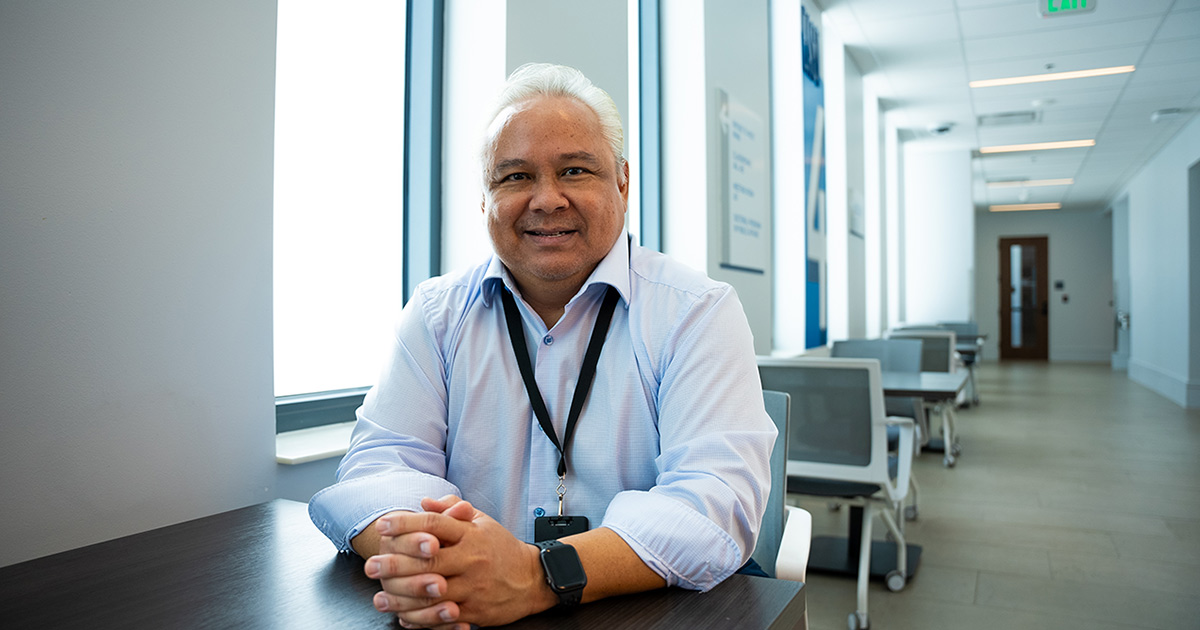With over a decade of academic and professional experience in the field himself, Romeo Lavarias is ready to help prepare UCF’s emergency management students for the future.
BY EVAN CHIOVARI | AUGUST 26, 2024

In his new role as practitioner-in-residence, Romeo Lavarias will use his hands-on emergency management experience to guide students though the complexities of disaster response. (Photo by Blake Osting)
In Fall 2024, Romeo Lavarias will join the School of Public Administration as a lecturer in emergency management. He comes to UCF after a long career as an emergency manager for the city of Miramar, Florida.
While functioning as a lecturer, Lavarias will fill the unique capacity of practitioner-in-residence — a seasoned industry professional appointed to teach and provide real-world insights to students.
Lavarias says his path to UCF began with his research and academic writing, through which he became familiar with the work of professor Claire Knox.
“Her name came up everywhere in my research, and her work was amazing,” he says. “Then, as luck would have it, I got to meet her at a conference. She told me UCF was opening a new position, and I went for it.”
Lavarias is excited for the opportunity. He considers UCF’s emergency management faculty the best in the field and emphasizes its public outreach efforts. Additionally, U.S. News & World Report recently ranked UCF’s Master of Emergency and Crisis Management the No. 1 emergency management program in the country. Lavarias is determined to help maintain that ranking.
“Whether you want to focus on policy or help at Ground Zero, there’s only one place to go for emergency management,” he says. “You’ve got to go to UCF. There is a different atmosphere here, and the university is so involved with the community. You rarely see that in academic institutions.”
Lavarias believes the next generation of emergency managers will face disasters on a much bigger scale than ever before. He cites changes in weather patterns resulting in phenomena such as deep freezes in Texas, heat waves in Portland, an earthquake off the coast of Cape Canaveral, and even a blizzard in Hawaii. To face these challenges and others, Lavarias says students need strong practical skills.
“When you’re out on the job, you have to make decisions at critical moments when you may not have all the information,” he says. “You need to think quickly and act accurately and ethically.”
As a self-styled “pracademic” — someone with practitioner experience and academic credentials — Lavarias plans to lend a real-world perspective to classroom learning. Lavarias emphasizes networking and collaboration as essential components of effective emergency management. He hopes his students will learn not only from him but from each other.
“My goal is to put as many tools in your toolbox as possible so that when you get out there, you can do your job well,” he says.
Lavarias also highlights emergency management as a highly diverse field with many practical applications and varying perspectives.
“Federal, state, county, private, public, nonprofit and faith-based organizations all have different takes on the subject,” he says. “The more variety of these I can bring to students, the more they’ll learn where their strengths and interests lie.”
Knox believes Lavarias’ practical approach is invaluable for students and subject-matter experts alike. “Dr. Lavarias’ expertise will contribute to the impactful, community-focused research our emergency management faculty are engaged in,” she says.
Professor Doug Goodman agrees, saying the School of Public Administration is excited to welcome Lavarias. “He brings a wealth of knowledge and experience that will help our students blend theory and practice,” Goodman says.
For those who may be curious about pursuing a career in emergency management, Lavarias has one piece of advice: be open-minded.
“Be open to applying your knowledge, skills and abilities to places you never thought you would,” he says. “In the end, you want to feel good about what you're doing.”
Lavarias holds a doctorate in public administration from Nova Southeastern University, a master’s degree in homeland security and defense from the Naval Postgraduate School, a master’s degree in public administration from the City University of New York, and a master’s degree in urban and regional planning from the University of Florida.